新人教版PEP五年级英语上册各单元知识点总结
新人教版PEP五年级英语上册各单元知识点复习总结
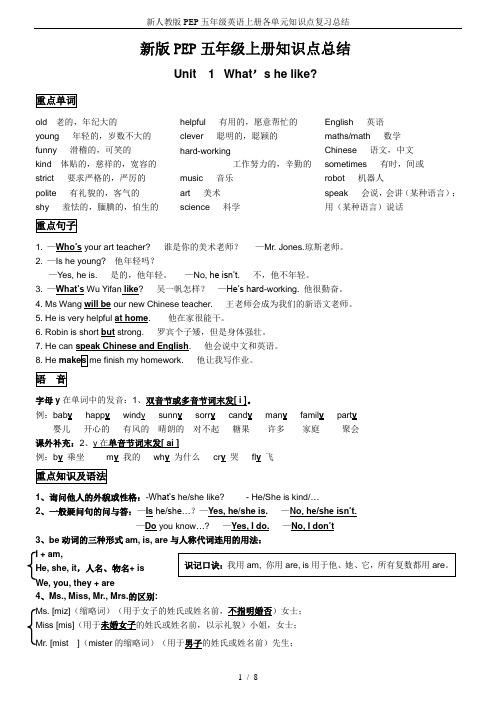
新人教版PEP五年级英语上册各单元知识点复习总结新版PEP五年级上册知识点总结Unit 1 What’s he like?重点单词old 老的,年纪大的young 年轻的,岁数不大的funny 滑稽的,可笑的kind 体贴的,慈祥的,宽容的strict 要求严格的,严厉的polite 有礼貌的,客气的shy 羞怯的,腼腆的,怕生的helpful 有用的,愿意帮忙的clever 聪明的,聪颖的hard-working工作努力的,辛勤的music 音乐art 美术science 科学English 英语maths/math 数学Chinese 语文,中文sometimes 有时,间或robot 机器人speak 会说,会讲(某种语言);用(某种语言)说话重点句子1. —Who’s your art teacher? 谁是你的美术老师?—Mr. Jones.琼斯老师。
2. —Is he young? 他年轻吗?—Yes, he is. 是的,他年轻。
—No, he isn’t.不,他不年轻。
3. —What’s Wu Yifan like? 吴一帆怎样?—He’s hard-working. 他很勤奋。
4. Ms Wang will be our new Chinese teacher. 王老师会成为我们的新语文老师。
5. He is very helpful at home. 他在家很能干。
6. Robin is short but strong. 罗宾个子矮,但是身体强壮。
7. He can speak Chinese and English. 他会说中文和英语。
8. He makes me finish my homework. 他让我写作业。
语音字母y在单词中的发音:1、双音节或多音节词末发[ i ]。
例:bab y happ y windy sunn y sorr y cand y man y famil y part y婴儿开心的有风的晴朗的对不起糖果许多家庭聚会课外补充:2、y在单音节词末发[ ai ]例:b y 乘坐m y 我的wh y 为什么cr y 哭fl y 飞重点知识及语法1、询问他人的外貌或性格:-What’s he/she like? - He/She is kind/…2、一般疑问句的问与答:—Is he/she…?—Yes, he/she is.—No, he/she isn’t.—Do you know…? —Yes, I do.—No, I don’t3、be动词的三种形式am, is, are与人称代词连用的用法:I + am,He, she, it,人名、物名+ isWe, you, they + are4、Ms., Miss, Mr., Mrs.的区别:Ms. [miz](缩略词)(用于女子的姓氏或姓名前,不指明婚否)女士;Miss [mis](用于未婚女子的姓氏或姓名前,以示礼貌)小姐,女士;Mr. [mist](mister的缩略词)(用于男子的姓氏或姓名前)先生;识记口诀:我用am, 你用are, is用于他、她、它,所有复数都用are。
2023年人教版(PEP)五年级英语上册总复习要点

五年级英语上册总复习要点PEP英语五年级上册四会单词词汇表Unit 1:young 年轻的 funny 滑稽可笑的tall 高的 strong 强壮的kind 和蔼的old 年老的helpful 有用的thin 瘦的Mr 先生like 像、喜欢strict 严格的clever 聪明的 polite有礼貌的quiet 安静的Unit 2:Mondy 星期一Tuesday 星期二Wednesday 星期三Thursday 星期四Friday 星期五Saturday 星期六Sunday 星期天have 有、吃 on 在…..时候do homework 做作业watch TV 看电视read books 读书wash my clothes洗我的衣服play football踢足球Unit 3:三明治 sandwich fish 鱼salad 沙拉冰激淋 ice cream potato 土豆tomato 西红柿for 为lunch 中餐sweet 甜的hot辣的fresh 新鲜的favourite 最喜欢的fruit 水果healthy健康的delicious可口的tea茶五年级上册四会句子:1.谁是你的英语老师?王老师。
Who’s your English teacher?Mr Wang .2.他长得什么样?他(是)高而强壮。
What’s he like ?He’s tall and strong . 3.她很安静吗?不是的。
她很活跃的。
Is she quiet ?No, she isn’t. She’s very active.4.她很严格么?是的,但她很和蔼的。
Is she strict ?Yes, she is , but she’s very kind .5 今天星期几?星期二。
What day is it today ?It’s Tuesday.6 星期二你们上什么课?What do you have on Tuesdays ?7 我们上数学和科学课。
人教版(PEP三年级起点)小学五年级英语上册知识点
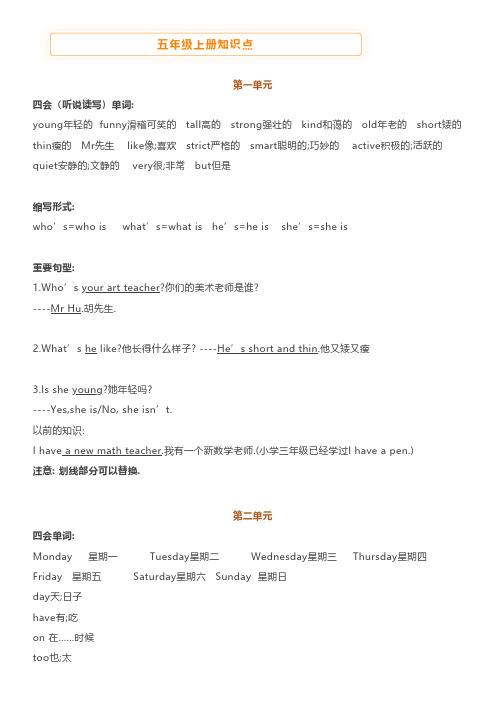
五年级上册知识点短语:do homework 做作业watch TV 看电视read books 读书What about? ......怎么样?do housework 做家务play computer games 玩电脑游戏重点句型:1.What day is it today?今天星期几?—It’s Monday.星期一.2. What do we have on Mondays?星期一我们有什么课?—We have English,science,computer and P.E.我们有英语课,科学,计算机跟体育课.3.What do you do on Saturdays?星期六你干什么?(具体的某一天前用介词on,在具体的时间前,用介词at)—I often do my homework.我通常做家庭作业.4.What about you?你呢?—I do my homework,too.我也是做家庭作业.第三单元四会单词:eggplant 茄子fish 鱼green beans 青豆tofu 豆腐potato 土豆tomato 西红柿for 为;给lunch 中餐;午饭we 我们tasty 好吃的;可口的sweet 甜的sour 酸的fresh 新鲜的salty 咸的favourite 最喜爱的;特别喜爱的fruit 水果grape 葡萄缩写形式:they’re=they are don’t=do not重点句型:1.What would you like for lunch?你午餐想吃什么?-----I’d like some tomatoes and mutton.我想吃一些西红柿跟羊肉.2.What’s your favourite fruit?你最喜欢的水果是什么?------/I like apples.我喜欢苹果.3.I don’t like grapes.我不喜欢葡萄.4.Bananas are my favourite.我最喜欢香蕉.第四单元一. 单词:empty the trash倒垃圾cook the meals 做饭water the flowers浇花sweep the floor扫地clean the bedroom打扫卧室make the bed铺床set the table摆餐具wash the clothes洗衣服do the dishes洗碗碟put away the clothes收拾衣服can’t = cannot(不会;不能)use a computer(使用计算机)二. 句子:1. I’m helpful! I can sweep the floor。
最新人教版PEP英语五年级上册各单元知识点归纳
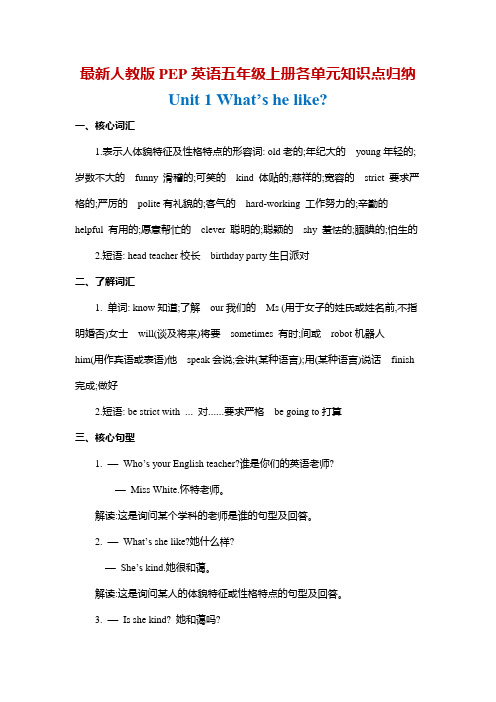
最新人教版PEP英语五年级上册各单元知识点归纳Unit 1 What’s he like?一、核心词汇1.表示人体貌特征及性格特点的形容词: old老的;年纪大的young年轻的;岁数不大的funny 滑稽的;可笑的kind 体贴的;慈祥的;宽容的strict 要求严格的;严厉的polite有礼貌的;客气的hard-working 工作努力的;辛勤的helpful 有用的;愿意帮忙的clever 聪明的;聪颖的shy 羞怯的;腼腆的;怕生的2.短语: head teacher校长birthday party生日派对二、了解词汇1. 单词: know知道;了解our我们的Ms (用于女子的姓氏或姓名前,不指明婚否)女士will(谈及将来)将要sometimes 有时;间或robot机器人him(用作宾语或表语)他speak会说;会讲(某种语言);用(某种语言)说话finish 完成;做好2.短语: be strict with …对……要求严格be going to打算三、核心句型1. —Who’s your English teacher?谁是你们的英语老师?—Miss White.怀特老师。
解读:这是询问某个学科的老师是谁的句型及回答。
2. —What’s she like?她什么样?—She’s kind.她很和蔼。
解读:这是询问某人的体貌特征或性格特点的句型及回答。
3. —Is she kind? 她和蔼吗?—Yes, she is.是的,她和蔼。
解读:这是询问某人性格特点的一般疑问句,用yes或no回答。
4. He is very helpful at home.他在家里非常愿意帮忙。
解读:这是描述他人特征的句型。
四、了解句型1. Hey, Ms Wang will be our new Chinese teacher.嘿,王老师将会是我们的新语文老师。
解读: will表示将要发生的动作或状态,意思是“将要”,后加动词原形。
新人教版PEP五年级英语上册各单元知识点总结

新版PEP五年级上册知识点总结Unit 1 What’s he likeold 老的,年纪大的young 年轻的,岁数不大的funny 滑稽的,可笑的kind 体贴的,慈祥的,宽容的strict 要求严格的,严厉的polite 有礼貌的,客气的shy 羞怯的,腼腆的,怕生的helpful 有用的,愿意帮忙的clever 聪明的,聪颖的hard-working工作努力的,辛勤的music 音乐art 美术science 科学English 英语maths/math 数学Chinese 语文,中文sometimes 有时,间或robot 机器人speak 会说,会讲(某种语言);用(某种语言)说话1. —Who’s your art teacher 谁是你的美术老师—Mr. Jones.琼斯老师。
2. —Is he young 他年轻吗—Yes, he is. 是的,他年轻。
—No, he isn’t. 不,他不年轻。
3. —What’s Wu Yifan like吴一帆怎样—He’s hard-working. 他很勤奋。
4. Ms Wang will be our new Chinese teacher. 王老师会成为我们的新语文老师。
5. He is very helpful at home. 他在家很能干。
6. Robin is short but strong. 罗宾个子矮,但是身体强壮。
7. He can speak Chinese and English. 他会说中文和英语。
8. He他让我写作业。
字母y在单词中的发音:1、双音节或多音节词末发[ i ]。
例:bab y happ y windy sunn y sorr y cand y man y famil y part y婴儿开心的有风的晴朗的对不起糖果许多家庭聚会课外补充:2、y在单音节词末发[ ai ]例:b y 乘坐 m y 我的 wh y 为什么 cr y 哭 fl y 飞1、询问他人的外貌或性格:-What’s he/she like - He/She is kind/…2、一般疑问句的问与答:—Is he/she…—Yes, he/she is.—No, he/she isn’t.—Do you know…—Yes, I do.—No, I don’t3、be动词的三种形式am, is, are与人称代词连用的用法:I + am,,人名、物名+ isWe, you, they + are4、Ms., Miss, Mr., Mrs.的区别:(缩略词)(用于女子的姓氏或姓名前,不指明婚否)女士;Miss [mis](用于未婚女子的姓氏或姓名前,以示礼貌)小姐,女士;Mr. [mist](mister的缩略词)(用于男子的姓氏或姓名前)先生;Mrs. [misiz](用于已婚女子的姓氏或姓名前)太太;夫人。
新pep人教版五年级英语上册第一二三单元知识点

新pep人教版五年级英语上册第一二三单元知识点2022新pep人教版五年级英语上册第一二2022新人教版小学五年级上册第一单元知识点Unit1What’helike 一.单词1.形容人的形容词新词:young年轻的old年老的kind和蔼的trict严格的funny滑稽可笑的clever聪明的polite有礼貌的helpful乐于助人的hy害羞的hard-working努力工作(学习)的复习:tall高的hort矮的trong强壮的fat胖的thin瘦的mart聪明的active积极的、活跃的quiet安静的、文静的nice好的lovely可爱的2.称呼用词:先生女士(未婚)M女士(不明是否已婚)Mr夫人(随丈夫姓)3.频率词:often经常uually通常有时4.任课教师anartteacher一位美术老师anEnglihteacher一位英语老师amathteacher一位数学老师aacher一位科学老师aacher一位语文老师amuicteacher一位音乐老师aPEteacher一位体育老师二.句型1.Who’your()teacher谁是你的()老师?Mr…...某先生…...某女士(未婚)。
M……..某女士(不明是否已婚)。
…….某夫人(随丈夫姓)。
括号里填科目2.问:What’()like某人怎么样?括号里可填:(he/he/yourfather/yourartteacher/ZhangPeng/MrLi)答He/Shei().括号里填描述人的形容词WangwillbeournewEnglihteacher.王女士将会是我们的新英语老师。
4.Ihe/hekind她是和蔼的吗?肯定回答Ye,he/hei.否定回答No,he/hein’Do youknowMrYoung你知道杨先生吗?肯定回答:Ye,Ido.否定回答:No,Idon’三.句型变换d.(变为疑问句)Id2ung.(对划线部分提问)What’Mikelike3.Iknow.(变为否定句)Idon’tknow.四.be动词的用法I→amIamhelpfuluYouadlweareWeagTheyareold.itItimallHeifud.四.字母y在单词结尾发音[I]happybabyunnywindanycandypartyfamilyclachedule课程表weekenddayTuedayWednedayThurdayFridaySaturdaySundagglaglaath mathmaaathmoraleducaglihartaPPglathmuicmoraleducauicart学校课程maathmathmath2022新人教版小学五年级上册第二单元知识点Unit2Myw一.单词二.1.星期:Monday星期一Tueday星期二Wedneday星期三Thurday 星期四Friday星期五Saturday星期六Sunday星期天week一周weekend 周末weekday工作日day天烹饪gcladule时刻表clachedule课程表4.短语:dohomework做作业watchTV看电视readbook读书wahmyclothe洗我的衣服playfootball踢足球layping-pang打篮球playbaketball打篮球la做运动plaa弹琵琶drawpicture画画lea打扫房间dohouework做家务luic听音乐二.句型Whatdaday今天星期几?It’Tueday.星期二。
五年级上册英语人教版(PEP)第三单元知识点

五年级第三单元复习考点:1.食物类词汇2.形容食物的词汇3.其他词汇或词组4.询问别人想吃什么句型5.询问别人想喝什么句型6.询问别人最喜欢的食物句型7.询问别人最喜欢的饮料句型8.名词复数规则一.食物类词汇三明治sandwich复数形式sandwiches 汉堡包hamburger复数形式hamburgers 蔬菜沙拉salad冰淇淋ice cream茶tea蔬菜vegetable复数形式vegetables 洋葱onion复数形式onions米饭rice面条noodles面包bread鱼fish牛肉beef牛奶milk水water果汁juice表示对事物的喜欢I like+可数名词复数/不可数名词.I love+可数名词复数/不可数名词.二、形容食物类的词汇(五个形容词)新鲜的,刚摘的fresh健康的healthy美味的,可口的delicious辣的,辛辣的hot甜的,含糖的sweet表示食物的特征:食物是单数:It's_______.(形容词)食物是复数:They’re_________.(形容词)三、其他词汇及词组最喜欢的食物my favourite food最喜欢的饮料my favourite drink►表示某人最喜欢的食物:某人的+favourite foodmy我的/your你的/her她的his他的/their他们的/its它的/our我们的我最喜欢的食物my favourite food你最喜欢的食物your favourite food他最喜欢的食物his favourite food►表示某人最喜欢的饮料:某人的+favourite drinkmy我的/your你的/her她的his他的/their他们的/its它的/our我们的我最喜欢的饮料my favourite drink你最喜欢的饮料your favourite drink他最喜欢的饮料his favourite drink四、询问别人想吃什么句型:问:What would you like to eat?答:I’d like+食物.食物.1.你想吃什么?我想吃一些面包。
英语人教版PEP五年级上册知识点汇总

英语知识点汇总
Unit 1 What's he like ?
用于询问外貌或性格特征。 What's he like ? What's she like ? What are they like ? What's ChenJie like ? What's Sarah like ?
Yes, I am. No,I'm not.
Unit 2 My week
星期一到星期日,首字母要大写。 Monday 星期一(Mon.) Tuesday星期二(Tues.) Wednesday星期三(Wed.) Thursday星期四(Thur.) Friday 星期五(Fri.) Saturday 星期六(Sat.) Sunday 星期日(Sun.)
合成词:两个简单的单词放在一起,变成一个新单词。 如:bedroom ,classroom
★★★ What do you have on Mondays ? What do you do on Mondays ?
I often do my homework on Sunday afternoon. →Do you often do your homework on Sunday afternoon ?
I don't like beef but chicken is OK. I like vegetables but not carrots. Don't eat too much. Be careful. Plaese clean the vegetables.
★★★ What's your favourite food ? What's Sarah's favourite food ? What's his father's favourite food ? What's his cousin's favourite animal ? My favourite food is beef. Sarah's favourite food is beef.
新pep人教版五年级英语上册第一二三单元知识点

新 pep 人教版五年级英语上册第一二三单元知识点2014 新人教版小学五年级上册第一单元知识点Unit 1 What ’s he like ?一.单词1.形容人的形容词新词: young 年青的 old年迈的kind平和的strict 严格的 funny 风趣可笑的 clever 聪慧的 polite 有礼貌的 helpful 乐于助人的 shy 害羞的 hard-working努力工作(学习)的复习:tall高的short矮的strong强健的fat胖的 thin瘦的smart聪慧的active踊跃的、活跃的quiet寂静的、娴静的nice好的lovely可爱的2.称号用词 : 先生女士(未婚) Ms女士(不明能否已婚) Mrs 夫人(随丈夫姓)3.频次词: often 常常 usually 往常有时4.任课教师an art teacher一位美术老师an English1 / 9teacher一位英语老师a maths teacher一位数学老师aacher一位科学老师aacher一位语文老师 a music teacher一位音乐老师a PE teacher一位体育老师二.句型1.Who’s your ( )teacher ?谁是你的()老师?Mr ...某先生。
...某女士(未婚)。
Ms..某女士(不明能否已婚)。
.某夫人(随丈夫姓)。
括号里填科目2 .问:What’s ( ) like ?某人怎么样?括号里可填:(she/he/your father/your artteacher/Zhang Peng/Mr Li)答 He /She is ( ) .括号里填描绘人的形容词Wang will be our new English teacher .王女士将会是我们的新英语老师。
4.Is she/he kind ?她是平和的吗?一定回答Yes,she/he is .否认回答No ,she/he isn’Do you2 / 9know Mr Young ? 你知道杨先生吗?一定回答:Yes ,I do . 否认回答: No ,I don’三.句型变换 d .(变成疑问句 )Id ?2ung .(对划线部分发问)What’s Mike like ?3.I know .(变成否认句) I don’t know .四. be动词的用法I→ am I am helpfulu You adlwe are We agTheyare old .it It is smallHe is fud .四.字母 y 在单词结尾发音[ I ]happy baby sunny windany candy party familyclasss chedule课程表weekenddayTuesdayWednesdayThursdayFridaySaturdayS undagglaglaathsmathsmaaathsmoral educaglishart aPPglathsmusicmoral educausicart学校课程maathsmathsmaths2014 新人教版小学五年级上册第二单元知识点Unit 2 My w一.单词二. 1. 礼拜: Monday 礼拜一 Tuesday 礼拜二Wednesday 礼拜三 Thursday 礼拜四 Friday礼拜五3 / 9Saturday 礼拜六 Sunday 礼拜天 week 一周 weekend 周末weekday 工作日 day 天烹调 g cladule时刻表classs chedule课程表4. 短语: do homework 造作业 watch TV看电视read books念书wash my clothes洗我的衣服play football踢足球 lay ping-pang打篮球play basketball打篮球la 做运动 plaa弹琵琶draw pictures画画lea打扫房间do housework做家务lusic听音乐二.句型 What daday ?今日礼拜几?It ’s Tuesday. 礼拜二。
新人教版PEP五年级英语上册各单元知识点总结

Saturday (Sat.)周六
weekend周末(周六、日)
wash my clothes洗衣服
重点句子
3.—Doyouoften read books in thispark你经常在这个公园看书吗
—Yes,Ido.是的—No,Idon’t.不是
4.Look atmy picture.看我的图片。
[u:]balloon气球food食物zoo动物园noodles面条
注:字母组合oo发音少数发短音[u],多数发长音[u:]。
重点知识及语法
1、询问对方会做什么事情:—Whatcan you do—Icanplay the pipa.
2、can句型的否定句:Ican’tplay the pipa.
3、can句型的一般疑问句的问与答:—Canyoudoanykungfu—Yes,I
Chinese语文,中文
shy羞怯的,腼腆的,怕生的sometimes有时,间或
helpful有用的,愿意帮忙的robot机器人
clever聪明的,聪颖的
hard-working
speak会说,会讲(某种语言);
用(某种语言)说话
工作努力的,辛勤的
重点句子
1.—Who’syour art teacher谁是你的美术老师—Mr.Jones.琼斯
日子today今天may可以
课外补充:
元音字母a在开音节中也发[ei]例:cake蛋糕face脸name
名字
重点知识及语法
1、therebe(is,are)句型的单复数形式:Thereisaclock.There
arelots offlowers.
课外补充:
PEP版小学英语五年级上册知识点汇总(全一册)
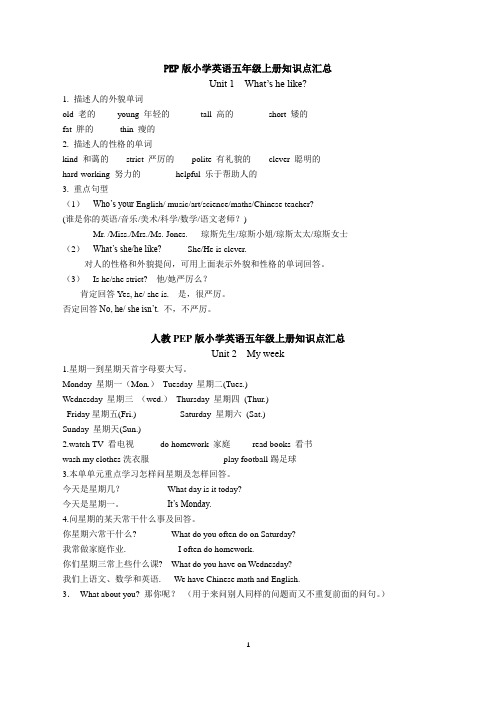
PEP版小学英语五年级上册知识点汇总Unit 1 What’s he like?1. 描述人的外貌单词old 老的young 年轻的tall 高的short 矮的fat 胖的thin 瘦的2. 描述人的性格的单词kind 和蔼的strict 严厉的polite 有礼貌的clever 聪明的hard-working 努力的helpful 乐于帮助人的3. 重点句型(1)---Who’s your English/ music/art/science/maths/Chinese teacher?(谁是你的英语/音乐/美术/科学/数学/语文老师?)---Mr. /Miss./Mrs./Ms. Jones. 琼斯先生/琼斯小姐/琼斯太太/琼斯女士(2)---What’s she/he like? ---She/He is clever.对人的性格和外貌提问,可用上面表示外貌和性格的单词回答。
(3)---Is he/she strict? 他/她严厉么?肯定回答Yes, he/ she is. 是,很严厉。
否定回答No, he/ she isn’t. 不,不严厉。
人教PEP版小学英语五年级上册知识点汇总Unit 2 My week1.星期一到星期天首字母要大写。
Monday 星期一(Mon.)Tuesday 星期二(Tues.)Wednesday 星期三(wed.)Thursday 星期四(Thur.)Friday星期五(Fri.) Saturday 星期六(Sat.)Sunday 星期天(Sun.)2.watch TV 看电视do homework 家庭read books 看书wash my clothes洗衣服play football踢足球3.本单单元重点学习怎样问星期及怎样回答。
今天是星期几?What day is it today?今天是星期一。
It’s Monday.4.问星期的某天常干什么事及回答。
最新PEP人教版英语五年级上册英语单词总结与讲解
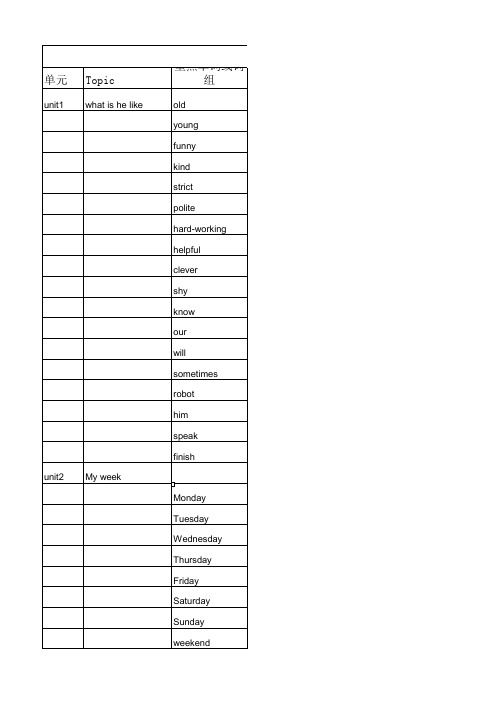
正面
be是i音前缀,ee为长元音e-e的变体,发长元音e-e的音
在.......中间
a是er音前缀,字母o在m,n,v,th前发u的音
在(或向).......上面
i-e发长元音i-e的音
在旁辺(附近)
i在nd前可以发长元音i-e
在(或向).......后边面
ere为R音节air的变体,发air的音
(表示存在或发生)
ቤተ መጻሕፍቲ ባይዱ
公园 瘦倦的 体育运动 应该,应当 每一个;每个 一天;一日
sch浊化成sg,e发短元音e音;dule发音特殊,发jool音
工作计划;日程安排
a发短元音a的音;i发短元音i的音
三明治
第一个a发短元音a的音,第二个a弱化成er
蔬菜沙拉;混合沙拉
a发短元音a的音;ur为R音节er的变体,er是er音后缀
画
ar为R音节;oo为组合音oo
漫画
oo为组合音oo
烹调;烹饪
i发短元音i的音
游泳
et是i音后缀,sk浊化成sg,al是组合音au的变体
打篮球
ar为R音节;y做元音视为i,发短元音i的音
聚会;派对
e发短元音e的音
下一个的;紧接着的;接下来的
字母o在m,n,v,th前发u的音,er是er音后缀
极好的;了不起的
house boating rabbit
小学五年级上册英语单词解析 解析
词义
o在ld前发长元音o-e
老的,年纪大的
ou是短元音u的变体,发短元音u音
年轻的;岁数不大的
u发短元音u音;y做元音视为i
滑稽的;可笑的
i在nd前可以发长元音i-e
体贴的;慈祥的;宽容的
pep人教版小学五年级英语上册各单元知识点归纳

pep人教版小学五年级英语上册各单元知识点归纳最新版人教版小学五年级英语上册复重点知识Unit1 What he like?重点单词: old年老的young年轻的XXX滑稽的kind和蔼的strict严格的polite有礼貌的hard-working工作努力的helpful有用的clever聪明的shy害羞的sometimes有时will将要know知道robot机器人XXX完成he‵s=he is他是who‵s=who is谁是Mr.先生XXX小姐XXX女士重点句子:1、A: Ms Wang will be our new Chinese XXX.XXX使我们新语文老师A: What’s she like?她怎么样?B: She’s very kind?她很和蔼A: Is she strict?她严格吗?B:Yes,sometimes.是的,有时候.2、A: Do you know Mr Young?你认识XXX吗?B: No,I don’t (否认回覆)不,不熟悉。
Yes,I do(一定回覆)是的,我熟悉。
3、A: Who is yourmath XXX?谁是你的数学教师?B: Mr Li李师长教师。
4、A: Is she strict?她严厉吗?B: Yes,sheis.(肯定回答)是的,她严格。
No,XXX.(否定回答),不严格。
Unit2 My week重点单词:XXX星期一XXX星期二XXX星期三XXX星期四Friday星期五Saturday星期六Sunday星期日weekend周末washmyclothes洗衣服watch TV看电视do homework做家庭作业read books读书play football踢足球often通常cooking烹饪tired疲惫的sport体育运动should应该day一天重点句子:1、A:What do you have on Fridays?星期五你有什么课?B:I have a PE class我有体育课2、Do you often play sports?你常常做运动吗?No,I don’t.I don’t like sports不是.我不喜欢做运动3、A: What do we have on Wednesdays ?礼拜三我们都有甚么课?B: We have English、science and XXX.我们星期三有英语、科学和计算机。
人教版小学五年级上册英语知识点归纳

人教版(PEP)小学五年级英语上册知识点归纳第一单元:四会单词:young年轻的funny滑稽可笑的tall高的strong强壮的kind和蔼的old年老的short矮的thin瘦的Mr先生like像;喜欢strict 严格的smart聪明的;巧妙的active积极的;活跃的quiet安静的;文静的very很;非常but但是缩写形式:who’s=who is what’s=what is he’s=he is she’s=she is重要句型:瘦----Yes,she is/No, she isn’t.以前的知识:have a pen.)注意: 划线部分可以替换.第二单元:四会单词:Monday 星期一 Tuesday星期二Wednesday星期三 Thursday星期四Friday 星期五Saturday星期六 Sunday 星期日day天;日子have有;吃on 在……时候too也;太短语:do homework 做作业watch TV 看电视read books 读书What about? ......怎么样?do housework 做家务play computer games 玩电脑游戏重点句型:1.What day is it today?今天星期几?—It’s Monday.星期一.2. What do we have on Mondays?星期一我们有什么课?—We have English,science,computer and P.E.我们有英语课,科学,计算机跟体育课.3.What do you do on Saturdays?星期六你干什么?(具体的某一天前用介词on,在具体的时间前,用介词at)—I often do my homework.我通常做家庭作业.4.What about you?你呢?—I do my homework,too.我也是做家庭作业.第三单元:四会单词:eggplant 茄子fish 鱼green beans 青豆tofu 豆腐potato 土豆tomato 西红柿for 为;给lunch 中餐;午饭we 我们tasty 好吃的;可口的sweet 甜的sour 酸的fresh 新鲜的salty 咸的favourite 最喜爱的;特别喜爱的fruit 水果grape 葡萄缩写形式:they’re=they are don’t=do not 重点句型:第四单元一. 单词:empty the trash倒垃圾cook the meals 做饭water the flowers浇花sweep the floor扫地clean the bedroom打扫卧室make the bed铺床set the table摆餐具wash the clothes洗衣服do the dishes洗碗碟put away the clothes收拾衣服can’t = cannot(不会;不能)use a computer(使用计算机)二. 句子:1. I’m helpful! I can sweep the floor。
人教版五年级上册英语知识点总结
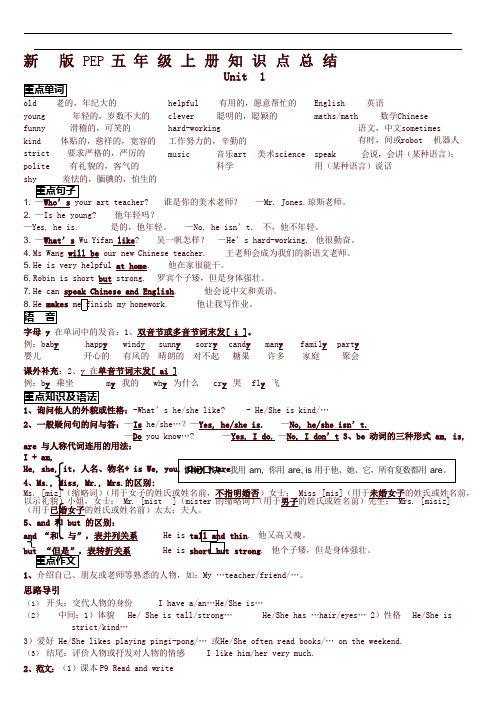
重点作文新 版 PEP 五 年 级 上 册 知 识 点 总 结Unit 1old 老的,年纪大的 young 年轻的,岁数不大的 funny 滑稽的,可笑的 kind 体贴的,慈祥的,宽容的strict 要求严格的,严厉的polite 有礼貌的,客气的 shy羞怯的,腼腆的,怕生的helpful 有用的,愿意帮忙的clever 聪明的,聪颖的 hard-working工作努力的,辛勤的music 音乐art 美术science 科学English 英语maths/math 数学Chinese 语文,中文sometimes 有时,间或robot 机器人 speak 会说,会讲(某种语言);用(某种语言)说话1. —Who’s your art teacher? 谁是你的美术老师? —Mr. Jones.琼斯老师。
2. —Is he young? 他年轻吗? —Yes, he is. 是的,他年轻。
—No, he isn’t. 不,他不年轻。
3. —What’s Wu Yifan like ? 吴一帆怎样? —He’s hard-working. 他很勤奋。
4. Ms Wang will be our new Chinese teacher. 王老师会成为我们的新语文老师。
5. He is very helpful at home . 他在家很能干。
6. Robin is short but strong. 罗宾个子矮,但是身体强壮。
7. He can speak Chinese and English . 他会说中文和英语。
8. He makes me finish my homework. 他让我写作业。
字母 y 在单词中的发音:1、双音节或多音节词末发[ i ]。
例:bab y happ y windy sunn y sorr y cand y man y famil y part y婴儿 开心的 有风的 晴朗的 对不起 糖果 许多 家庭 聚会课外补充:2、y 在单音节词末发[ ai ] 例:b y 乘坐 m y 我的 wh y 为什么cr y 哭 fl y 飞1、询问他人的外貌或性格:-What’s he/she like?- He/She is kind/…2、一般疑问句的问与答:—Is he/she…?—Yes, he/she is. —No, he/she isn’t.—Do you know…? —Yes, I do. —No, I don’t 3、be 动词的三种形式 am, is,are 与人称代词连用的用法: I + am,He, she, it ,人名、物名+ is We, you, they + are 4、Ms., Miss, Mr., Mrs.的区别: Ms. [miz](缩略词)(用于女子的姓氏或姓名前,不指明婚否)女士; Miss [mis](用于未婚女子的姓氏或姓名前,以示礼貌)小姐,女士; Mr. [mist ](mister 的缩略词)(用于男子的姓氏或姓名前)先生; Mrs. [misiz](用于已婚女子的姓氏或姓名前)太太;夫人。
新人教版PEP五年级英语上册各单元重点知识归纳

新人教版PEP五年级英语上册各单元重点知识归纳Unit 1: Hello!- Greetings: Hello, Hi, Good morning, Goodbye- Introducing oneself: My name is..., I'm..., Nice to meet you- Numbers: 1-20- Classroom objects: desk, chair, book, pen, pencil, rulerUnit 2: My Schoolbag- Stationery items: eraser, pencil sharpener, glue, crayons, scissors - Colors: red, blue, green, yellow, black, white- Personal pronouns: I, you- Plural forms of nouns: pens, pencils, rulers, booksUnit 3: My Friends- Adjectives: happy, sad, tall, short, thin, fat- Describing appearance: He/She is..., They are...- Possessive adjectives: my, your, his, her, their- Talking about friends: I have a friend. His/Her name is... Unit 4: My Home- Rooms in a house: living room, bedroom, kitchen, bathroom - Prepositions: in, on, under, near- Furniture: sofa, bed, table, chair- Demonstrative pronouns: this, that, these, thoseUnit 5: Food and Drinks- Food items: apple, banana, orange, sandwich, hamburger- Drinks: water, milk, juice, tea- Expressing likes and dislikes: I like..., I don't like...- Question words: What, Where, WhoUnit 6: At the Market- Fruit: grapes, strawberries, watermelon, pineapple- Vegetables: carrot, tomato, onion, potato- Countable and uncountable nouns: an apple, some bananas, a glass of milk- Shopping phrases: How much is..., I want...Unit 7: In the Park- Outdoor activities: play football, fly a kite, ride a bicycle- Weather: sunny, rainy, windy- Present continuous tense: I am playing, He is running- Adverbs: slowly, quicklyUnit 8: My Family- Family members: father, mother, brother, sister- Describing relationships: This is my..., He/She is my...- Possessive 's: Dad's book, Mom's bag- Expressing family activities: We have dinner, We go swimmingUnit 9: At the Zoo- Animals: panda, lion, elephant, giraffe, monkey, tiger- Describing animals: big, small, tall, short, fast, slow- Present simple tense: Lions eat meat, Monkeys swing on trees - Plural forms of animals: pandas, monkeys, tigersUnit 10: At the Farm- Farm animals: cow, horse, pig, chicken, goat- Animal sounds: moo, neigh, oink, cluck, baa- Expressing abilities: I can..., He/She can...- Prepositions of location: in front of, behindUnit 11: Nature Park- Nature elements: river, tree, flower, grass, mountain- Adverbs of frequency: always, usually, sometimes, never- Asking about preferences: Do you like..., Which do you like...Unit 12: Let's Celebrate!- Festivals: Christmas, Spring Festival, Easter, Halloween- Activities during festivals: decorate, light candles, give gifts - Recounting past events: Last year, I..., We...。
人教版PEP三起小学英语五年级上册知识点总结

五年级上册期末复习知识总结(人教版PEP)Unit1 What's he like?一、重点单词old 老的,年纪大的young 年轻的,岁数不大的funny 滑稽的,可笑的kind体贴的,慈祥的,宽容的strict 要求严格的,严厉的polite 有礼貌的,客气的shy羞怯的,腼腆的,怕生的helpful 有用的,愿意帮忙的clever 聪明的,聪颖的hard-working 工作努力的music音乐art 美术science 科学English 英语maths/math 数学Chinese 语文,中文sometimes 有时,间或robot 机器人speak会说,会讲(某种语言)active 积极的、活跃的principal校长university student大学生like像、喜欢quiet安静的;文静的tall高的short矮的very 很、非常What's = what iswho's = who isshe's = she ishe's = he is二、重点句子(Who,What引导的特殊疑问句,用来对不熟悉的老师进行问答:Who's +某人?What's he /she like?He /She is +与身体特征和性格特征有关的形容词。
)1. 询问人—Who's your art teacher?谁是你的美术老师?—Mr.Jones.琼斯老师。
( Is引导的一般疑问句,谈论某位人是否具有某方面的特征:Is he /she +与身体特征和性格特征有关的形容词,回答用:Yes, he / she is. No, he / sheisn't. )2. —Is he young?他年轻吗?—Yes,he is.是的,他年轻。
或—No,he isn't.不,他不年轻。
—Is she strict?她很严格么?—Yes, she is , but she's very kind.是的,但她很和蔼的。
- 1、下载文档前请自行甄别文档内容的完整性,平台不提供额外的编辑、内容补充、找答案等附加服务。
- 2、"仅部分预览"的文档,不可在线预览部分如存在完整性等问题,可反馈申请退款(可完整预览的文档不适用该条件!)。
- 3、如文档侵犯您的权益,请联系客服反馈,我们会尽快为您处理(人工客服工作时间:9:00-18:30)。
新人教版PEP五年级英语上册各单元知识点总结Unit 1 What’s he like?重点单词新人教版PEP五年级英语上册各单元知识点总结young 年轻的;岁数不大的funny 滑稽的;可笑的kind 体贴的;慈祥的;宽容的strict 要求严格的;严厉的polite 有礼貌的;客气的shy 羞怯的;腼腆的;怕生的helpful 有用的;愿意帮忙的clever 聪明的;聪颖的hard-working工作努力的;辛勤的music 音乐art 美术science 科学English 英语maths/math 数学Chinese 语文;中文sometimes 有时;间或robot 机器人speak 会说;会讲(某种语言);用(某种语言)说话新人教版PEP五年级英语上册各单元知识点总结1. —Who’s your art teacher? 谁是你的美术老师?—Mr. Jones.琼斯老师.2. —Is he young? 他年轻吗?—Yes, he is. 是的;他年轻. —No, he isn’t.不;他不年轻.3. —What’s Wu Yifan like? 吴一帆怎样?—He’s hard-working. 他很勤奋.4. Ms Wang will be our new Chinese teacher. 王老师会成为我们的新语文老师.5. He is very helpful at home. 他在家很能干.6. Robin is short but strong. 罗宾个子矮;但是身体强壮.7. He can speak Chinese and English. 他会说中文和英语.8. He makes me finish my homework. 他让我写作业.语音字母y在单词中的发音:1、双音节或多音节词末发[ i ].例:bab y happ y windy sunn y sorr y cand y man y famil y part y婴儿开心的有风的晴朗的对不起糖果许多家庭聚会课外补充:2、y在单音节词末发[ ai ]例:b y 乘坐m y 我的wh y 为什么cr y 哭fl y 飞重点知识及语法1、询问他人的外貌或性格:-What’s he/she like? - He/She is kind/…2、一般疑问句的问与答:—Is he/she…?—Yes, he/she is.—No, he/she isn’t.—Do you know…? —Yes, I do.—No, I don’t3、be动词的三种形式am, is, are与人称代词连用的用法:I + am,He, she, it;人名、物名+ isWe, you, they + are4、Ms., Miss, Mr., Mrs.的区别:Ms. [miz](缩略词)(用于女子的姓氏或姓名前;不指明婚否)女士;Miss [mis](用于未婚女子的姓氏或姓名前;以示礼貌)小姐;女士;Mr. [mist](mister的缩略词)(用于男子的姓氏或姓名前)先生;Mrs. [misiz](用于已婚女子的姓氏或姓名前)太太;夫人.5、and和but的区别:and “和;与”;表并列关系He is tall and thin. 他又高又瘦.but “但是”;表转折关系He is short but strong. 他个子矮;但是身体强壮.重点作文My …teacher/friend/….思路导引(1)开头:交代人物的身份I have a/an…He/She is…(2)中间:1)体貌He/ She is tall/strong…He/She has …hair/eyes…2)性格He/She is strict/kind…3)爱好He/She likes playing pingi-pong/…或He/She often read books/… on the weekend. (3)结尾:评价人物或抒发对人物的情感I like him/her very much.识记口诀:我用am, 你用are, is用于他、她、它;所有复数都用are.2、范文:(1)课本P9 Read and write(2) My Chinese teacherI have a new Chinese teacher. She is Ms. Chen. She is tall and thin. She has big eyes and long black hair. She is kind and funny. Sometimes she is strict, too. She is hard-working. She likes reading. Her class is so much fun. We all like her.Unit 2 My weekPEP 五年级英语上册各单元知识点总结Monday (Mon.) 周一Tuesday (Tue./Tues.) 周二 Wednesday (Wed./Weds.) 周三Friday (Fri.) 周五 Saturday (Sat.) 周六weekend 周末(周六、日) wash my clothes 洗衣服 watch TV 看电视read books 看书 play football 踢足球on the weekend 在周末play sports/do sports 做体育运动 listen to music 听音乐 play ping-pong 打乒乓球我们上数学、英语和音乐课.2. 爷爷;星期四你要做什么? —I have a cooking class with your grandma. 我和你奶奶去上烹饪课.3. —Do you often read books in this park? 你经常在这个公园看书吗? —Yes, I do. 是的 —No, I don’t. 不是4. Look at my picture. 看我的图片.5. You look tired . 你看 起来很累.你应该每天做运动.字母组合ee, ea 在单词中的的发音:[ i: ]例:f ee t b ee f m ee t s ee fee d t ea r ea d ea t rep ea t 脚 牛肉 遇见 看见 喂养 茶 阅读 吃 重复注:1、ee 组合绝大部分发长音[ i: ];只有少部分发短音[ i ];如:coffee 咖啡[ i: ];还有可能发[ e ]等发音;如:bread 面包;或者发[ ei ];如:great 好极了1、 询问做什么事/活动:—What do you do …? —I often play ping-pong …询问星期几上什么课:—What do you have on …? —We have English class … 2 —Yes, I do . —No, I don’t. 3、 ;如:on Monday/Tuesday … 课外’clock 在十二点整;如:in 2014 在2014年 in the morning/afternoon/evening 4、play + 球类、棋类、娱乐活动;如:play football/ping-pongplay the pipa/piano/violin …1、描写一周的生活;如:My week思路导引(1)开头:简单的自我介绍:My name ’s …/ I ’m …(2)中间:1) 介绍周一至周五的情况;可以着重介绍自己最喜欢的那一天:I go to school from Monday to Friday. I like …because I have … 2)介绍自己周六、日的活动:I often watch TV/…on the weekend.(3)结尾:This is my week. What about yours? 2、范文:My weekMy name is Li Ming. I go to school from Monday to Friday. I like Tuesdays and Thursdays, because I have music and PE. I often do my homework and read books on Saturdays. I often play ping-pong on Sundays.Unit 3What would you like? 重点单词新人教版PEP五年级英语上册各单元知识点总结hamburger 汉堡包tea 茶sandwich 三文治salad 沙拉fresh 新鲜的;刚摘的healthy 健康的delicious 美味的;可口的hot 辣的;辛辣的sweet 含糖的;甜的hungry 饿的thirsty 渴的;口渴的favourite 特别喜爱的food 食物drink 喝;饮carrot 胡萝卜chicken 鸡肉onion 洋葱milk 牛奶bread 面包beef noodles 牛肉面fish sandwich 鱼肉三明治tomato soup 西红柿汤新人教版PEP五年级英语上册各单元知识点总结1.—What would you like to eat? 你想吃什么?—A sandwich, please. 请给我一个三明治.—What would you like to drink? 你想喝什么?—I’d like some water. 我想喝点水.2. —What’s your favourite food?你最喜欢吃什么食物?—Noodles. They are delicious. 面条.面条很好吃.3. My/His /Her favourite food is fish. 我/他/她最喜欢的食物是鱼.4. I’m hungry/thirsty. 我饿/渴了.5. I don’t like beef but chicken is OK. 我不喜欢牛肉但是鸡肉也可以.6. Onions are my favourite vegetable. 洋葱是我最喜欢的蔬菜.7. I like vegetables but not carrots. 我喜欢吃蔬菜但不喜欢胡萝卜.语音字母组合ow在单词中的发音:[ au ] ;[例:[ au ] c ow奶牛fl ow er 花w ow哇d ow n 向下h ow如何;怎样n ow现在[sl ow慢的sn ow雪yell ow黄色wind ow窗户sn ow y 下雪的tomorr ow明天重点知识及语法What would you like to eat/drink? —I’d like…2、询问最喜欢的事物:—What’s your favourite food/vegetable/…? —My favourite food/…is…/I like…3、名词复数的规则变化:(1)直接加s;(2)以s, x, sh, ch结尾的;加es;如;bus es box es sandwich es(3)以o结尾;有生命的加es;如;potato es tomato es无生命的加s;如;photo s piano s zoo s补充:(4)以辅音加y结尾;改y为i再加es;如;famil ies bab ies以元音加y结尾;直接加s;如;boy s day s(5)以f或fe结尾;改f为v再加es;如knife-kni ves小刀leaf-lea ves树叶4、some+可数/不可数名词例:some apple s(可数)some water/rice/juice/bread/…(不可数)课外补充:不可数名词(词后不可以加-s/es;所接动词用单数is /V-s/es)液体water milk tea orange(桔汁)coke juice气体air(空气)食物food rice bread fruit肉类meat(肉)fish beef chickenpaper(纸)time music weather(天气)snow money重点作文思路导引(1)开头:简单介绍自己的家庭成员:There are…people in my family. They are…(2)中间:分别介绍每个家庭成员最喜爱的食物时什么:…favourite food is…/…is…favourite./…like(s)…best.(3)结尾:穿插说明喜欢的原因:It’s/They’re…2、范文:(1)课本P29 Read and write(2)There are four people in my family. They are my parents, my brother and me. My mother likes saladbest. It ’s fresh. Beef is my father ’s favourite. He thinks (认为)it ’s delicious. My brother likes ice cream. It ’ssweet. My favourite food is fish. It ’s very healthy.Unit 4 What can you do?PEP 五年级英语上册各单元知识点总结sing English songs 唱英文歌曲 play the pipa 弹琵琶draw cartoons 画漫画 swim 游泳speak English 说英语 cook 烹饪;烹调play ping-pong 打兵乓球 draw pictures 画画clean the classroom 打扫课室1. We ’ll have an English party next Tuesday! 我们下周二将举行英语派对.2. —What can you do for the party? 你能为派对做些什么呢? —I can sing English songs. 我能唱英文歌.3. How/What about you? 你呢?4. Can you do any kung fu? 你会打功夫吗? —Yes, I can. 是的;我会. —No, I can ’t. 不;我不会. 5. No problem . I can help you. 没问题.我会帮你.6. I can play ping-pong, but I can ’t swim. 我会打乒乓球;但我不会游泳.7. Please send me an email at *****************. 请给我发邮件;邮箱*****************.字母组合oo 在单词中的发音:[ u ];[ u: ]例:[ u ]ball oo n f oo d z oo n oo dles 发音少数发短音[ u ];多数发长音[ u: ] .1、询问对方会做什么事情:—What can you do? —I can play the pipa.2、can 句型的否定句:I can ’t play the pipa.3、can 句型的一般疑问句的问与答:—Can you do any kung fu? —Yes, I can./No, I can ’t.4、play + the + 乐器;例 play the erhu /pipa /piano …play + 球类、棋类、娱乐活动;例 play basketball/football/ping-pong … 5、some 与any 的异同:相同之处:都有“一些”的含义;不同之处:some+可数名词复数/不可数名词(用于肯定句中) 例:I can do some kung fu. 我会打功夫.any+可数名词复数/不可数名词(用于否定句或疑问句中)例:I can ’t do any kung fu. 我不会打功夫. Can you do any kung fu? 你会打功夫吗?课外补充:1)any 还可以用于肯定句;作“任何的”解.例:Any student can answer this question. 任何学生都能回答这个问题. 21、描写自己或家庭成员会做的事情;如:I ’m helpful / Super family ;思路导引(1)开头:介绍自己或家庭成员的基本情况:I’m… I ’m …years old.I have a super family. There are three people in my family. They are…(2)中间:介绍自己在家和在学校里会做的事情/介绍家人的外貌性格以及会做的事情:I can…at school. I can…at home.My father is strong. He can do some kung fu. My mother is…She can…(3)结尾:总结 This is me. What can you do?This is my family. I love my family. Can you tell me your family?/What about your family?2、范文:(1)课本P43 Read and write(2) Hello, I ’m Zhao Ming. I ’m eleven years old. I ’m helpful. I can clean the windows and sweep the floorat school. I can cook and wash my clothes at home.I often play the pipa on the weekend. I can play basketball. I like English very much. I can speak English well. What can you do?Unit 5PEP 五年级英语上册各单元知识点总结photo 照片;相片 plant 植物water bottle 水瓶in front of 在……前面 beside 在旁边(附近) between 在……中间behind 在(或向)……后面 above 在(或向)……上面 their 他们的 lots of 许多 dirty 肮脏的 near 在附近house 房屋;房子;住宅1. Your room is really nice ! 你的房间真漂亮!2. There is a big bed. 有一张床.3. 我的电脑在书桌这里.4. This is my room. .5. There are so many picture 这有许多照片.6. My father can draw very well . 我父亲画的很好.7 .—Where is the ball? 球在哪里? —It ’s in front of the dog. 在狗的前面. 8. There is a tree in front of the house. 在房子前有棵树. 我住在自然公园附近.ai, ay 在单词中的发音:[ ei ]例:r ai ny 下雨的 r ai nbow 彩虹 p ai nt 涂色 w ai t 等待s ay 说 w ay 路;方法 birthd ay生日 Mond ay 周一 d ay 天;日子 tod ay 今天 m ay 可以 课外补充:[ ei ] 例:c a ke 蛋糕 f a ce 脸 n a me 名字1、there be (is, are )句型的单复数形式:There is a clock. There are lots of flower 课外补充:(1(2 相同之处:都有“有”的含义不同之处:there be 表示“某地有……”(无生命的);主语放在句末;例:There is a book on the desk. 书桌上有一本书.have/has 表示“某人有……”(有生命的);放在主语(人)的后面.例:I have a book. 我有一本书.2、询问方位或地点:—Where is the ball? —It’s in front of the dog.3、lots of + 可数/不可数名词= a lot of + 可数/不可数名词 “许多比较:many + 可数名词复数 “许多……” 例:There are many treemuch + 不可数名词 “许多…....” 例:I drink much water every day. 我每天喝很多水. 4、动词+very well 例:My father can draw very well 我爸爸画的很好例:The book is very good . 这本书非常好.My room / bedroom ;思路导引(1)开头:总体概括自己卧室的特征 I have a nice/big/clean/…room. (2)中间:描述卧室里的物品、摆设 There is/are ….on/beside/… … is on the desk/….(3)结尾:抒发对卧室的情感 I like/love my bedroom (very much)! Can you tell me yours?2、范文:(1)课本P53 Read and write(2)My bedroomI have a nice bedroom. It’s not big but clean.I like my bedroom. Can you tell me yours?Unit 6 重点单词新人教版PEP五年级英语上册各单元知识点总结hill 山丘;小山river 河;江mountain 高山;山岳lake 湖;湖泊village 村庄;村镇house 房屋;房子;住宅tree 树;树木;乔木bridge 桥go boating 去划船nature park 自然公园people 人;人们rabbit 兔子duck 鸭子animal 动物high 高的children 孩子们(child的复数形式)新人教版PEP五年级英语上册各单元知识点总结1. Children, let’s go to the forest. 孩子们;让我们去森林吧.2. —Is there a river in the forest? 森林里有河流吗?—Yes, there is.是;有的. —No, there isn’t.不;没有.3. The nature park is so quiet! 自然公园这么安静!4. There aren’t many people. (这里)人不多.5. —Are there any tall building s in the nature park? 自然公园例有高楼吗?—Yes, there are.是;有的. —No, there aren’t.不;没有.6. —How many? 多少? —Two. 两个.7. Robin is at Mr. Jones’ house. 罗宾在琼斯先生的房子里.语音字母组合ou在单词中的发音:[ au ]例:h ou se 房屋;房子m ou se 老鼠s ou nd 声音;听起来c ou nt 数数提示:字母组合ow也有些发[ au ];例:c ow奶牛h ow如何;怎样d ow n 向下课外补充:字母组合ou在单词中还可读[ u: ];如s ou p 汤gr ou p 群;团体;和[ ;如y ou ng 年轻的.重点知识及语法1、there be句型的一般疑问句的问与答:—Is there a lake? —Yes, there is. —No, there isn’t.—Are there any animal s? —Yes, there are. —No, there aren’t.2、there be(is, are)句型的单复数形式(具体见Unit 5的重点知识及语法):例:There is a nature park near the house. There are many duck s on the lake.3、some与any在肯定句、否定句及问句中的用法:some+可数名词复数/不可数名词(用于肯定句中)例:There are some books on the desk.any+可数名词复数/不可数名词(用于否定句或疑问句中)例:There aren’t any people in the forest.Are there any tall buildings in the natures park?4、people人;人们(集体名词;明为单数;实为复数;词末不能加-s)例:There are many people in the park.重点作文1、描写景物;如:看图作文(风景图)思路导引(1)开头:Look at the picture.(2)中间:用There is/are…beside/in front of…句型描述图中所有的景物及其位置;注意要有明确的观察主线;即观察的顺序性与条理性.2、范文:(1)课本P63 Read and write(2)看图作文Look at the picture. This is a beautiful village. There are three houses in thepicture. There are many trees near them. In front of the houses, there is a river.The bridge is over the river. Behind the houses, there is a forest and a mountain.。
